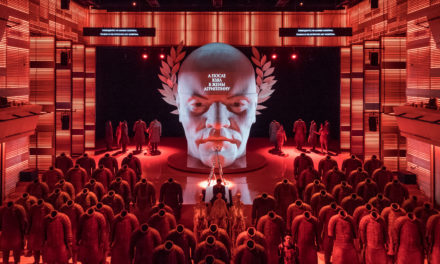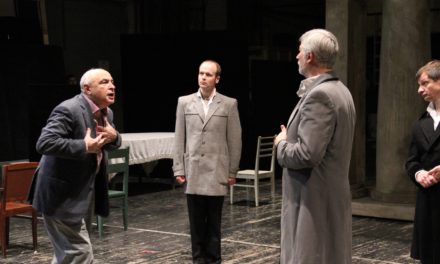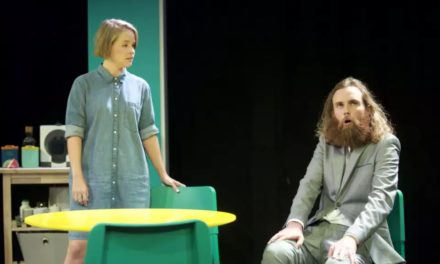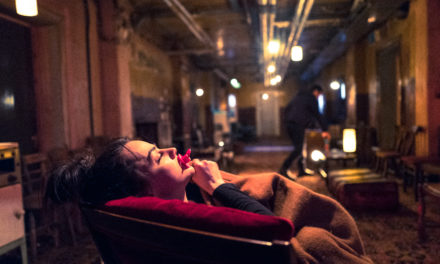The world premiere of Octavia. Trepanation was highly anticipated by the Dutch audience at Holland Festival 2017 for many reasons. Given its moderate budget, co-producing a new opera is exceptional for this yearly Dutch festival. In addition, the head of Lenin all over the city of Amsterdam is not your everyday poster image, which further raised expectations for the new opera production. And, last but not least, this was the first time a brand-new theatre production from Moscow was being presented in The Netherlands. We were ready for a very special artistic happening.
Entering the room of the Muziekgebouw aan het IJ (the Dutch name of the performance hall) on opening night, one immediately saw a highly intriguing set design. The giant replica of Lenin’s head, adorned with the laurel wreath of the Greek emperors and guided on both sides by a phalanx of eighty oversized and beheaded terracotta soldiers, set one’s imagination into third gear. Greek and Chinese emperors—violent and bloody—intertwine with the Russian Revolution and its emperor Lenin, violent and bloody too.
Octavia. Trepanation investigates the bloody mechanisms of the revolution one hundred years ago. The opera is conceptualized and elaborated by Sergey Adonev and Boris Yukhananov, the artistic director of Moscow’s Stanislavsky Electrotheatre. The music is composed by Dmitri Kurliandski, based on a revolutionary hymn—”Varshavyanka,” one of Lenin’s favorite songs, which was recorded by the Red Army choir who died in a plane crash last year—and lasts over ninety minutes. The text is taken from the Marxist revolutionary Leon Trotsky and excerpts from Octavia, a play attributed to Seneca, about the Roman emperor Nero. They call their new work an “opera-operation,” and we will soon understand the source of this categorization.
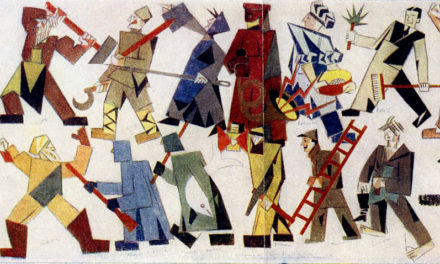
Photo by Andrey Bezukladnikov
After the terracotta warriors line up by the jester-like Red Army soldiers during the opening sounds of the electronic composition, the skull of Lenin/Nero opens up slowly and spectacularly (the trepanation), giving way to a small stage on which Seneca (Alexei Kokhanov, baritone) and Nero (Sergey Malinin, tenor) sing their long atonal monologues in forceful and eerie voices, to intoxicating effect. The back of the skull serves as a horizontal screen on which Greek temples, dark figures, barbed wire (the camps), blood, and flames are projected. From behind the monumental head the ghost of Agrippina, Nero’s mother (Arina Zvereva, mezzo soprano), moves slowly forward, uttering her words from the underworld. The choir concealed inside the headless warriors hums somber notes from deep down in their army fatigues. On the platform in front of the head, Trotsky (Yury Duvanov, actor) delivers his comments from behind three centaur skeletons attached to a cart that moves around slowly, led by the soldiers. In line with the subject matter of the opera, death and destruction is the main theme of Stepan Lukyanov’s set design. The production caters to all the senses in spectacular fashion, also thanks to Anastasia Nefedova’s costumes. The trepanation culminates in a Buddha figure that, by inflation, is erected inside Lenin’s skull. According to director Boris Yukhananov, the Buddha is replacing the violent brain of the leader(s) of the revolution, instilling peace instead of bloodshed. The operation—or brainwash if you like— is completed and successful.
Though there is no direct reference to any actual political situation, one can hardly fail to surmise the head of Putin behind the mask of Lenin. Is it a coincidence that an opera referring to the Russian revolutionary leader who overturned the tsarist regime one hundred years ago is opening in Amsterdam, the capital of the country that served as an example for Peter the Great, who visited Amsterdam in 1697 in his quest for ways to modernize his own country? Maybe Boris Yuchananov is taking the same detour to arrive at the corresponding result in bringing his Trepanation to Moscow. In the end, his Stanislavsky Electrotheatre is just a stone’s throw from the Kremlin.
Octavia. Trepanation received mixed reactions in the Dutch newspapers. According to De Volkskrant (***) the opera is “looking great and the singers have beautiful voices. But the libretto lacks narrative and is meaningless.” NRC Handelsblad (**) considers the music “intoxicating,” but the opera is “lacking conflict.” The newspaper asks whether the emergence of the Buddha is “an act of cynicism or utopia”. “Or, (since this is Russia), perhaps both?” The Amsterdam newspaper Het Parool (**) considers the music “grey.” “It all looks pretty good, but God knows what it’s about.” Theaterkrant.nl (***) is impressed by the work as a piece of “visual art.” “The most impressive part of this musical electro-theatre is the scenography,” but “the scenography and the music deserved a better libretto.”
Concept, conceptual elaboration: Boris Yukhananov, Sergey Adonev
Music: Dmitri Kurliandski
Libretto: Boris Yukhananov, Dmitri Kurliandski
Direction: Boris Yukhananov
Set design: Stepan Lukyanov
Costume: Anastasia Nefedova
Choreography: Andrey Kuznetsov-Vetsieslov
Sound: Oleg Makarov
World premiere: 15 June 2017, Muziekgebouw aan het IJ, Amsterdam
This post was written by the author in their personal capacity.The opinions expressed in this article are the author’s own and do not reflect the view of The Theatre Times, their staff or collaborators.
This post was written by Constant Meijers.
The views expressed here belong to the author and do not necessarily reflect our views and opinions.

